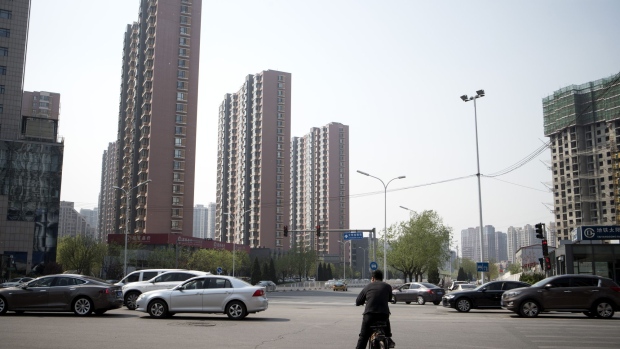Jul 18, 2022
China Weighs Mortgage Grace Period to Appease Angry Homebuyers
, Bloomberg News

(Bloomberg) -- China may allow homeowners to temporarily halt mortgage payments on stalled property projects without incurring penalties, people familiar with the matter said, as authorities race to prevent a crisis of confidence in the housing market from upending the world’s second-largest economy.
Under a yet-to-be-finalized proposal from financial regulators, hundreds of thousands of buyers of stalled homes would be allowed to pause mortgage payments with no impact on their credit scores, the people said, asking not to be identified discussing a private matter. The plan is part of a broader push to stabilize the property market that includes urging local governments and banks to plug some of the funding shortages at developers, the people said.
Authorities are ramping up efforts to backstop the real estate sector after mortgage payment boycotts snowballed in recent days, impacting at least 230 projects across 80 cities as of Friday. Total mortgages at stalled Chinese developments amount to 2 trillion yuan ($296 billion), according to analysts at GF Securities Co. and Deutsche Bank AG.
While a payment holiday could backfire if it encourages owners of completed properties to also protest for relief after home prices slumped, regulators are calculating the move is necessary to inject confidence into the market and buy time for developers to complete projects. Homeowner eligibility and the length of grace periods will be decided by local governments and banks, the people said.
The proposal, which still requires approval from senior Chinese leaders, underscores mounting concerns within Xi Jinping’s government over the risks to social stability from a more than yearlong property crisis that began with debt troubles at China Evergrande Group and has since touched nearly every corner of the nation’s real estate industry.
While the turmoil stems partly from efforts by the Communist Party to rein in excessive real estate leverage and speculation, policy makers have in recent months been rolling out support measures for the industry after it was pummeled anew by the country’s strict Covid Zero strategy.
Officials have been particularly sensitive to any signs of social unrest, censoring crowd-sourced documents on mortgage boycotts earlier this month. Xi is widely thought to be placing a premium on social stability before a leadership confab this year at which he’s expected to secure a precedent-breaking third term in power.
In addition to mortgage boycotts, protests have raged since May in Henan province over what may be the nation’s biggest-ever bank scam. Authorities started repaying most of the victims last week even as a police investigation is still ongoing.
The stakes are high for Xi’s government, homeowners and investors. About 70% of the country’s household wealth is stored in property, along with 30-40% of bank loan books, while land sales account for 30-40% of local government revenue, according to Pantheon Macroeconomics. The mortgage boycotts have roiled Chinese stocks, heightened stress in the country’s credit market and dragged down commodities from iron ore to copper.
“In a worst-case scenario, the issue could trigger systemic financial risk and social instability, given housing’s role as a bedrock of the broader financial system,” Gabriel Wildau, a managing director at global business advisory firm Teneo, wrote in a note. “Policy makers are likely to act quickly to contain this emerging crisis.”
The China Banking and Insurance Regulatory Commission didn’t immediately respond to requests for comment.
Investors have already welcomed early signs of government intervention. Shares of developers jumped on Monday, recouping some of their steep losses from last week, after a report in a newspaper published by the CBIRC that regulators urged banks to increase lending to developers so they can complete unfinished housing projects. The rally also extended to shares of banks, even though they potentially face a hit to profits by offering relief to homeowners and extending fresh loans to troubled property projects.
Regulators have also asked China Construction Bank Corp., the nation’s largest mortgage lender, to explore a pilot program to set up a fund with selected local governments to purchase projects under construction that have yet to find buyers, with the aim of converting them into apartments for long-term rentals, a person familiar with the matter said. China Construction Bank didn’t immediately respond to a request for comment.
Banks have so far said they can handle growing stress in the mortgage market, with default rates at about 0.3% nationwide, according to the latest data. Lenders have reported 2.1 billion yuan of delinquent mortgages related to the boycott movement, or less than 1% of their portfolios. Overall, Chinese banks sit on 38 trillion yuan of outstanding residential mortgages and 13 trillion yuan of loans to the country’s beleaguered developers.
Still, the property market is just one of myriad problems facing the Chinese financial system. Earlier this year, Liu Jun, the president of Bank of Communications Co., one of China’s largest state-owned banks, said the lender faces the most challenging year in his 30-year banking career, citing Covid, geopolitical risks and shrinking domestic demand.
©2022 Bloomberg L.P.






